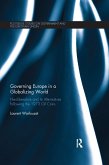Problems posed by Syria s chemical weapons attacks, Egypt s ouster of an elected government, and myriad other global dilemmas beg the question of whether and how the world can be governed. The challenge is addressing what former UN Secretary-General Kofi Annan called Problems without Passports environmental, economic, humanitarian, and political crises that threaten stability, prosperity, and even human survival. Everything is globalized everything "except" politics, which remain imprisoned behind national borders. The world has changed, but our basic way of managing it has not. We pursue fitful, tactical, short-term, and local responses for actual or looming threats that require sustained, strategic, longer-run, and global actions. With clarity and passion, Thomas G. Weiss argues for a diversity of organizational arrangements some centralized, some decentralized and a plurality of problem-solving strategies some worldwide, some local. He proposes a three-pronged strategy: the expansion of the formidable amount of practical global governance that already exists, the harnessing of political and economic possibilities opened by the communications revolution, and the recommitment by states to a fundamental revamping of the United Nations."
Bitte wählen Sie Ihr Anliegen aus.
Rechnungen
Retourenschein anfordern
Bestellstatus
Storno








